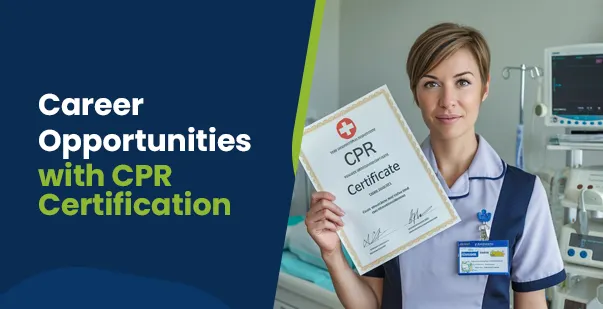Cardiopulmonary Resuscitation (CPR) is a basic life-saving technique that can be applied in situations where someone’s breathing or heartbeat has stopped. With chest compressions and rescue breaths, learning CPR will allow you to maintain circulation and oxygenation to vital organs until advanced medical personnel arrive. Given its importance in health and safety, having CPR certification allows you to respond confidently in these high-stress situations. While it is commonly associated with healthcare professionals, the requirement for CPR certification extends across many industries.
In this blog, we will explore the various jobs that require CPR certification and examine the reasoning behind its importance in each profession.
Master ACLS Now
Get ACLS certified with confidence
Jobs That Require CPR Certification
There are many professions, from childcare providers to fitness instructors, who need credibility to prove their ability to administer life-saving interventions. Are you wondering? What jobs can I get with a BLS certification or a CPR certification? Read on to find out the jobs that require CPR certification.
Healthcare Professionals
Medical professionals regularly encounter situations where the health and safety of individuals can change rapidly. CPR ensures they are equipped to handle cardiac emergencies until advanced medical care arrives. Some of the CPR-certified jobs in the healthcare sector include:
Doctors and Nurses
Doctors and nurses are often the first responders in medical emergencies in clinical settings. Given that cardiac arrest can happen anywhere, both are required to have CPR certification. Healthcare settings, such as emergency rooms, intensive care units, and surgical suites, frequently deal with patients who have compromised heart or respiratory function. To save lives, healthcare professionals must be able to perform CPR confidently and effectively.
Emergency Medical Technicians (EMTs) and Paramedics
The National Library of Medicine highlights that performing CPR for 46–195 seconds before defibrillation significantly boosts survival rates. Thus, EMTs and paramedics are on the frontlines of emergency care, responding to accidents, injuries, and medical emergencies in the community. The majority of their work revolves around administering first aid and life-saving interventions. Their ability to perform CPR while stabilizing patients and transporting them to medical facilities can make a significant impact on the victim’s survival chances.
Other Healthcare Providers
Other healthcare providers, such as respiratory therapists, nursing assistants, and physical therapists, may also be required to hold CPR certification. In many cases, patients under their care are at higher risk for sudden health crises, especially if they have pre-existing conditions like heart disease or pulmonary issues. Having CPR certification ensures that healthcare providers can respond quickly if a patient experiences cardiac arrest, respiratory failure, or other critical issues.
Childcare Providers
Childcare workers frequently deal with young children, whose small bodies are more vulnerable to accidents, choking, or sudden medical emergencies. CPR certification is often required for anyone working in a childcare facility, as children can experience cardiac or respiratory emergencies due to various factors like choking, drowning, or accidents.
Preschool Teachers and Daycare Workers
Preschool teachers and daycare workers have to keep children safe throughout the day. Children, especially infants and toddlers, are at high risk for choking, respiratory distress, and even sudden cardiac arrest. A daycare facility or preschool setting must be prepared to handle emergencies at any time, and emphasizing CPR certification jobs ensures they can respond immediately if a child stops breathing or their heart stops beating. CPR training for young children and infants differs from that for adults, which is why daycare workers need to be specifically trained in pediatric CPR.
School Bus Drivers
School bus drivers transport children every day, which puts them in a position to respond to a wide range of potential emergencies. Whether it’s an accident, a sudden allergic reaction, or a student experiencing a medical emergency, school bus drivers are expected to have CPR certification. Knowing how to perform CPR on children can help prevent the situation from becoming fatal while waiting for emergency medical help to arrive.
Nannies
Private childcare providers, such as nannies, are responsible for the safety of children in their care. Given the high-risk nature of working with infants and children, nannies are among the jobs that require CPR certification. Moreover, parents who hire a nanny will often specifically request CPR certification to ensure that the caregiver is prepared for any emergency.
Fitness and Sports Professionals
Fitness and sports professionals work with individuals in high-energy environments where accidents and injuries can happen frequently. Additionally, they often work with people who may have underlying health conditions that increase the likelihood of sudden medical emergencies, such as heart attacks, strokes, or asthma attacks.
Personal Trainers
Personal trainers work with clients to improve their physical fitness, which can involve intense exercise regimens. The physical demands of working out, combined with clients’ health risks, create a scenario where CPR certification is necessary. If a client suffers from cardiac arrest or a related issue during a session, a personal trainer with CPR certification can quickly assist the client until emergency medical personnel arrive.
Fitness Instructors
Whether teaching yoga, pilates, spinning, or aerobics, fitness instructors lead groups of participants through vigorous exercise routines. Group fitness classes are typically high-intensity, and instructors are often responsible for guiding participants of all fitness levels. CPR certification ensures that the instructor can respond to an emergency, such as a participant collapsing or having difficulty breathing during a class.
Sports Coaches and Athletic Trainers
Coaches and athletic trainers who work with teams or individual athletes in schools, universities, and professional sports need CPR certification to handle potential medical emergencies. Athletes are at risk of injuries such as concussions, fractures, heat strokes, and heart attacks. Athletic trainers, in particular, are responsible for preventing injuries and assisting athletes who need immediate medical care. Coaches should also be trained in CPR to ensure that they can react appropriately if a player collapses or experiences sudden health distress.
Lifeguards
Lifeguards are stationed at swimming pools, beaches, or other aquatic environments, where there is always the risk of drowning or near-drowning incidents. Lifeguards must be well-versed in CPR and rescue breathing techniques to assist swimmers who experience difficulty. In cases of drowning or cardiac arrest, the immediate response of a lifeguard can save a life, making CPR certification a critical aspect of their training.
Public Safety and Emergency Services
When you wonder what jobs you can get with a CPR certification, you cannot ignore the professionals in public safety and emergency services. Public safety personnel, including firefighters, police officers, and search-and-rescue teams, work in high-risk environments and respond to emergencies of all kinds. CPR certification is required for these professionals to ensure they are ready to act in life-threatening situations.
Firefighters
Firefighters are frequently called upon to respond to fires, accidents, and rescues in various environments. Often, they arrive at the scene of an emergency before paramedics and other healthcare professionals, which means they must be equipped to administer immediate life-saving interventions. Whether a person is trapped in a building, suffering from smoke inhalation, or experiencing a cardiac event, firefighters must have CPR training to provide critical care before the patient is transported to the hospital.
Police Officers
Police officers are often the first to respond to emergencies, whether they are investigating accidents or dealing with medical situations. Cardiac arrests, accidents, and injuries can happen unexpectedly, and police officers, as they fall under the jobs that need CPR certification, will be better prepared to provide immediate care. Their prompt response can greatly increase the chances of survival for the individuals involved in emergencies.
Hospitality and Travel Industry
The hospitality and travel industry encompasses a broad range of jobs, from cruise ship staff to hotel employees. In these environments, workers interact with guests and passengers who may require immediate medical attention, especially in the case of a medical emergency or accident.
Cruise Ship Staff
Cruise ship staff, including hospitality workers, entertainers, and tour guides, often work in close quarters with large numbers of people. In the event of an accident or medical emergency, staff members must be trained in CPR to assist passengers or fellow employees. Whether someone falls ill, has a heart attack, or suffers an injury, having CPR-certified personnel available helps mitigate the situation until more advanced care is available.
Flight Attendants
Flight attendants are responsible for the safety and well-being of passengers during air travel. They are trained to handle a wide variety of emergencies, including medical crises like cardiac arrest or breathing difficulties. Since medical help can be far away on an airplane, flight attendants with CPR certification can provide immediate assistance in these critical situations.
Hotel Staff
In some cases, hotel staff, particularly those working in resorts with pools or spas, are required to have CPR certification. Accidents can happen at any time, and if a guest experiences a medical emergency, hotel personnel trained in CPR can provide the necessary intervention until help arrives.
Other Jobs That Require CPR Certification
In addition to the professions outlined above, there are many other jobs where CPR certification is essential for employee safety and readiness. These include:
Construction Workers
Construction sites are hazardous, with workers often dealing with heavy machinery, working at heights, or managing dangerous materials. In case of accidents, such as a fall or cardiac event, CPR certification can be crucial to saving a life.
Event Staff and Security Personnel
Event staff and security personnel working at concerts, festivals, conferences, or sporting events are often stationed in areas with large crowds. CPR training ensures they can respond to medical emergencies that may arise during an event, whether due to medical conditions, accidents, or other health crises.
Volunteers in Emergency Situations
Volunteers who assist in emergencies, such as natural disasters, community health events, or humanitarian efforts, are often required to have CPR certification. These volunteers provide essential support in emergency scenarios, and their ability to perform CPR can be life-saving.
How do you write CPR Certified on a resume?
When adding your CPR certification to your resume, present it clearly and professionally. This highlights your ability to handle emergencies and showcases your dedication to preparedness. Knowing where and how to list your CPR certification can significantly impact your job prospects. Here are some best practices on how to write CPR certified on a resume.
Choose the Right Section
The first step in properly listing your CPR certification is determining where to place it on your resume. Here are a few options:
- Certifications Section: If you have several certifications, this is the most appropriate place for them. If they are highly relevant, they can be near the bottom of your resume or under your “Skills” section.
- Skills Section: For resumes that are skills-focused, listing CPR as a skill is a great option.
- Professional Summary/Experience Section: If CPR is particularly relevant to the role you’re applying for, you might mention it in your professional summary or within the experience section to emphasize your qualifications.
Include the Certification Details
Specify the certifying organization, including the date of certification and expiration. For example:
- CPR Certified – (Organisation name), Certified: May 2024
- BLS (Basic Life Support) Certification –(Organisation name) Expires: January 2026
Be Specific When Necessary
If your CPR certification includes specialized training or a specific type of CPR, such as infant CPR or pediatric CPR, make sure to note that. Employers may want to see specific qualifications depending on the role. For instance,
- Pediatric CPR Certified, Organisation name, Expires June 2025
- CPR and AED Certified, Organisation name, Expires June 2025
Use Action-Oriented Language
If you are applying for jobs that require a CPR license and emphasize emergency preparedness, healthcare, safety, or physical fitness, be sure to highlight your CPR certification by placing it in the most prominent section of your resume. In the experience section, describe any role where you used your CPR skills. For example:
- “Certified in CPR and First Aid, providing immediate assistance during emergencies in a daycare setting.”
- “Administered CPR to an injured participant during a fitness class, ensuring immediate care until emergency responders arrived.”
Conclusion: Enhancing Workplace Safety through CPR Certification
As the world continues to prioritize safety and preparedness, CPR certification will remain a fundamental part of training for individuals in numerous fields. Being aware of jobs that require CPR certification will help you become a capable and confident candidate, enhancing your career prospects. The credential will empower you to act quickly in emergencies, giving you the knowledge and skills to provide life-saving care.
References
- 20+ Careers That Require CPR Certification | Red Cross
- 26 CPR Certification Jobs (With Duties and Salaries) | Indeed.com
- 11 Jobs Where You’ll Benefit from CPR Training | CPR Classes Raleigh
- 40 Careers That Require CPR / AED Certification – Rescue One Training For Life
- 25 Careers that Require CPR & First Aid Certification | Online CPR & First-Aid Certification Courses







